The half-moon high overhead intermittently beamed through the clouds last night as Annie and I quietly navigated the lumbering hay rack wagon loaded with 4000 lbs of preserved summer grass out to our waiting beeves. Red and Jingle, the hugely muscular draft geldings walked out in cadenced rhythm across the frozen field of white. There we would fork grassy and well preserved slices reminiscent of the rich green of high Pahsimeroi summer.
There shone no lights except shafts of moonlight, the twinkle of stars in sky windows and the lights of distant ranches. The ethereal lunar glow was enough that I could see the expectant ears of the geldings turned back toward us on the hay rack, waiting for any word that would signal a change in their action.
We sailed across the Alderspring prairie in silence as would a ship; the only sounds were the wooden wagon creaking under the 2 tons of hay, the jingle of trace chains, and the steady whooshing of horses’ hooves in deep snow. The black-as-night Kelpie dog, Mindy, silently stood free of the front rack we held on to. Instead, she chose the open floorboards, balancing on the heaving deck. The beeves met us halfway across the field.
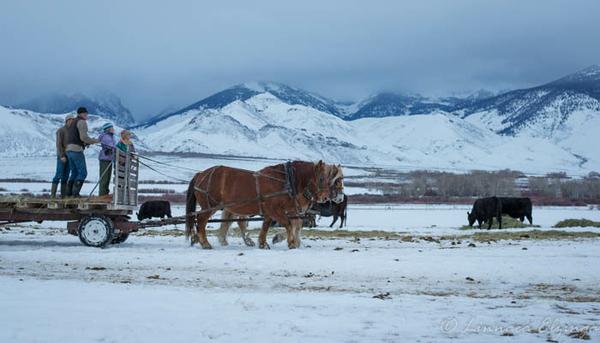 The half-moon high overhead intermittently beamed through the clouds last night as Annie and I quietly navigated the lumbering hay rack wagon loaded with 4000 lbs of preserved summer grass out to our waiting beeves. Red and Jingle, the hugely muscular draft geldings walked out in cadenced rhythm across the frozen field of white. There we would fork grassy and well preserved slices reminiscent of the rich green of high Pahsimeroi summer.
The half-moon high overhead intermittently beamed through the clouds last night as Annie and I quietly navigated the lumbering hay rack wagon loaded with 4000 lbs of preserved summer grass out to our waiting beeves. Red and Jingle, the hugely muscular draft geldings walked out in cadenced rhythm across the frozen field of white. There we would fork grassy and well preserved slices reminiscent of the rich green of high Pahsimeroi summer.
There shone no lights except shafts of moonlight, the twinkle of stars in sky windows and the lights of distant ranches. The ethereal lunar glow was enough that I could see the expectant ears of the geldings turned back toward us on the hay rack, waiting for any word that would signal a change in their action.
We sailed across the Alderspring prairie in silence as would a ship; the only sounds were the wooden wagon creaking under the 2 tons of hay, the jingle of trace chains, and the steady whooshing of horses’ hooves in deep snow. The black-as-night Kelpie dog, Mindy, silently stood free of the front rack we held on to. Instead, she chose the open floorboards, balancing on the heaving deck. The beeves met us halfway across the field.
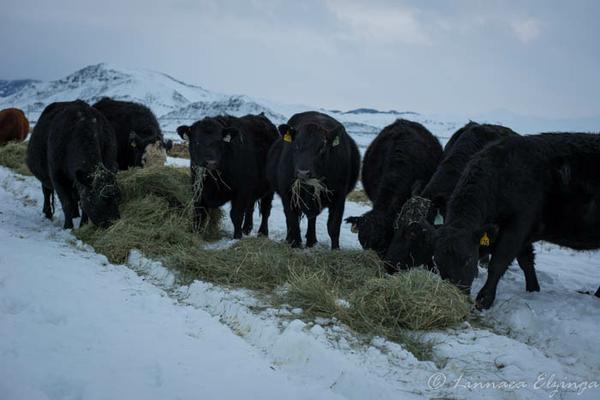 We switched lines again, and Annie took over to fork hay—her preference. Her small body was dwarfed by the ton bale, and if she didn’t balance and use her weight just right to coax the hay off the wagon, she could easily fall off with a slice of hay that weighed more than she did. But she did just right, as practice would have it, and kept her feet under her as the rack pitched and rolled across the moonlit field. Kelpie Mindy occasionally got buried in the hay maelstrom. She would shake free, keeping her place on deck. She too had been swept overboard with the falling hay and stampeded after by curious and playful steers as soon as she hit the ground.
We switched lines again, and Annie took over to fork hay—her preference. Her small body was dwarfed by the ton bale, and if she didn’t balance and use her weight just right to coax the hay off the wagon, she could easily fall off with a slice of hay that weighed more than she did. But she did just right, as practice would have it, and kept her feet under her as the rack pitched and rolled across the moonlit field. Kelpie Mindy occasionally got buried in the hay maelstrom. She would shake free, keeping her place on deck. She too had been swept overboard with the falling hay and stampeded after by curious and playful steers as soon as she hit the ground.
I looked over the team straining the traces tight, leaning forward against the friction of heavy snow. I held the lines lightly across their backs; they needed no words of encouragement. Jing and Red knew the work at hand, and used their body mass to their elegant advantage. A tractor would get easily get stuck in snow like this. It was why we were using the team; they alone enabled us to widely distribute our load of green and ensure the placement of nutrient and bacteria-rich cow manure and wasted hay over all of our meadows. Where we navigated was actually a planned distribution of organic matter into a soil biota that lay suspended in hibernation over the winter. In the spring as the soil biota wakes, it will incorporate its winter feast and in a beautiful dance make those nutrients available to the roots of the grasses that grow in these soils. And then back into the cow, or into hay, to cycle around again.
Looking over Jing and Red, my eyes wandered beyond the meadow to the shining mountains that rose six thousand more feet above our mile-high valley bottom. The peaks had reverse leopard spots of light all over their steep faces where moonbeams found portholes in the cloud cover. It was impossible to tell where the horizon of mountain range ended and sky began because the sky had exactly the same pattern on it of hole and cloud.
All glowed white, as the hills were covered from base to peak by snow. The scene was resplendent with a blurry luminescence of half-moon light playing with the continual fog rising from the geldings’ broad backs. The occasional snow flurries landed on them and melted on contact. The heat from the furnace within their massive 1 ton bodies worked outward, vaporizing snow along with their sweat into a swirling steam.
 Small groups of steers would dash ahead of us like dolphins in front of a galleon. They would buck and cavort immediately in front of Jing and Red, taunting them to give chase. The geldings would shake their heads and grunt at them when the beeves stopped right in the path, but at the last minute, the steers would explosively take off again, with bovine tails turned high in glee.
Small groups of steers would dash ahead of us like dolphins in front of a galleon. They would buck and cavort immediately in front of Jing and Red, taunting them to give chase. The geldings would shake their heads and grunt at them when the beeves stopped right in the path, but at the last minute, the steers would explosively take off again, with bovine tails turned high in glee.
We were walking in beauty. It was one of those times where all was well and I rested in the rightness around me. The horses leaned into their evening task and kicked into an easygoing trot as we turned back to the ranch, now empty and ready for another 4000 lbs. The beeves put their heads down to their task of harvesting wild grasses from clean snow, and the coyotes joyfully sang on from the hillside grandstands around us. We would do one more load tonight, but I could do several more trips before I tired of the chore and the setting that surrounded the scene.
It was nearly 9 o’clock when we finished our chores for a day, pulling the heavy duty leather draft harness from Jing and Red in the warm and dimly lit barn. As I hung it up, I wondered how many horses over perhaps a hundred years that black harness had set on. With care, that leather will last a hundred more. Annie stood by with a curry comb, ready to comb the moist hair of horse clean of sweat when they were free of leather. We led the geldings through the barn, and freed them to their snowy abode for the night where they too could enjoy summer hay and mineral waters. Both took time to roll in the deep powder and icy white, shaking a geyser of snow in the moonlight as they rose from the ground.
There were only a few things to do yet. We gathered firewood from under the snow to keep our homestead warm for the night. We checked to make sure all the dogs were good to go for a cool winter’s eve, and turned the Great Pyrenees, Jackie, loose to patrol over the prairie wastes for coyotes or wolves that roamed too close. As I trundled down to the house in the pickup deep within the snowy trench that was our lane, a great horned owl lighted just a few feet from my open window on the high snow drift. He lifted and relighted several times as I worked my way down the driveway. It was as if he had something to show or tell me. Finally, at one point I stopped at the waiting owl; he and I eyed each other suspiciously in the moonlight. His piercing eyes atop his 2 foot tall frame met mine as we stared at each other over a few feet as if he were saying: “What right do you have to the night?”
 The truth is that I have no right here; only privilege. In spite of the hard work, our lives with long days upon nights are a gift in this world that knows little of the word quiet. There is that peace here, and integrity, because of the perfect fit of what we do into a circle of life.
The truth is that I have no right here; only privilege. In spite of the hard work, our lives with long days upon nights are a gift in this world that knows little of the word quiet. There is that peace here, and integrity, because of the perfect fit of what we do into a circle of life.
And you, friends, all are part of that circle. We just occupy the husbandry part of the wheel, standing quietly alongside beeves sustainably harvesting from these living volcanic soils a richness that makes them healthy and highly productive. You harvest from them, allowing us by your contribution to continue through the next year of grass. It seems appropriate that grass, that simple and ancient plant family without fanciful flowers, is becoming recognized as the humble but better way of growing our protein, as nature has done for eons.
Thanks for not breaking that chain, and instead strengthening it. We appreciate your partnership that lets us keep learning and growing in an alternative model of animal husbandry. And we hope that what we grow for you blesses your palate and your health.
Happy Trails.
Glenn, Caryl, Cowboys and Girls at Alderspring Ranch

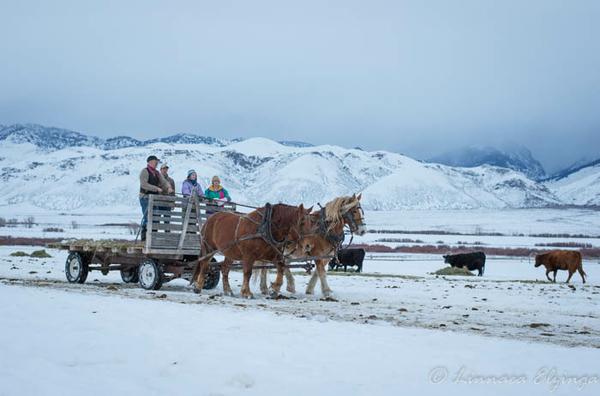



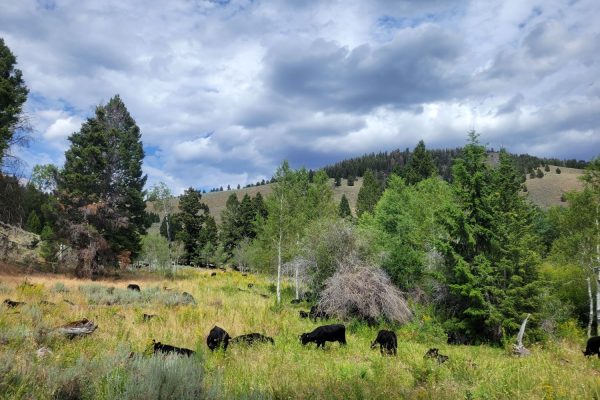

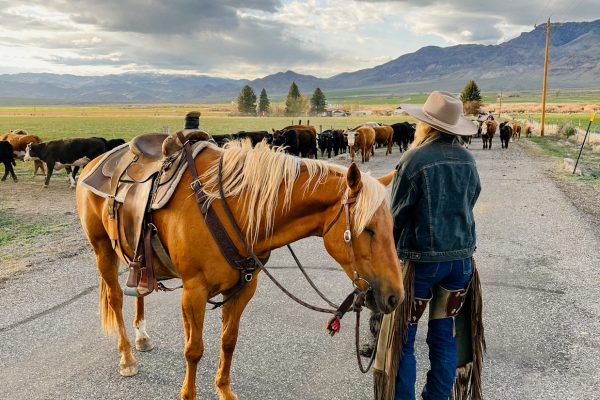
Leave a Reply